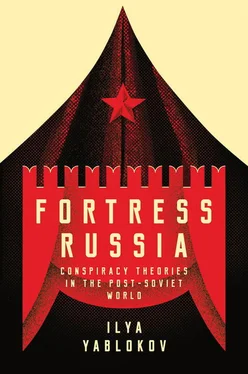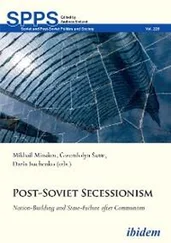The Narratives of the Soviet Collapse in Putin’s Russia
In the twenty-first century, the government-sponsored nation-building project included intense speculation about the causes of the Soviet collapse, and fear that it was primarily due to the malign activities of Western plotters who were becoming increasingly prominent in politics. Putin summed up the official attitude towards the collapse in 2005 in his opening address to the Federal Assembly, when he described it as ‘the major geopolitical disaster of the century’ (Putin, 2005). This view, which had some public support at the beginning of the 2000s, was widely disseminated by pro-Kremlin politicians and loyal public intellectuals in the years which followed, and helped foster nostalgia about Soviet times (Dubin, 2011).
Putin’s view of the Soviet collapse capitalized on a particular sociocultural position, which Serguei Oushakine (2009b) described as ‘the patriotism of despair’. Feelings of regret about the demise of the great country, supported by the conviction that this was the result of a conspiracy by ‘Western enemies’, encouraged national cohesion and made it seem as though the political leadership was in tune with the people. Putin placed much emphasis on the socio-economic and political inequalities which Russians suffered in the wake of the Soviet collapse. In this way he was able to foster a positive attitude towards a lost past, which he contrasted so significantly with the post-Soviet situation; hence it served as an important tool with which to identify ‘the people’ as a pan-national ‘community of loss’, in opposition to the collective ‘Other’ which was formed of those who shared no such nostalgia for the Soviet past (Oushakine, 2009a, p. 114). Members of this collective ‘Other’ generally consisted of the most ‘Westernized’ part of Russian society. This made it possible to portray them in the emerging official discourse as ‘agents’ of foreign influence. As we shall see, this rested, once again, on conspiracy narratives.
Putin’s opening remarks to the Federal Assembly outlined the events of the previous decade, and included several elements which make it clear how popular the conspiracy discourse about the Soviet collapse had become in the 2000s and 2010s. The first, and most crucial, part of Putin’s speech referred to the most dramatic issues of the post-1991 era:
Tens of millions of our co-citizens and compatriots found themselves outside Russian territory. Moreover, the epidemic of disintegration infected Russia itself. Individual savings depreciated and old ideals were destroyed. Many institutions were disbanded or reformed carelessly. Terrorist intervention and the Khasavyurt capitulation that followed damaged the country’s integrity. Oligarchic groups – possessing absolute control over information channels – served exclusively their own corporate interests. Mass poverty began to be seen as the norm. And all this was happening against the backdrop of a dramatic economic downturn, unstable finances, and the paralysis of the social sphere. (Putin, 2005)
This focus on social trauma indicates the populist approach taken by the ruling political elites to unite a highly-divided society on the basis of common negative experiences. Reference to ‘the oligarchic groups’ immediately after the mention of mass poverty and severe economic hardship appealed to the masses, who contrasted the current situation with the relative economic stability of the 2000s (Shcherbal’, 2010). At the same time, an emphasis on ‘oligarchical rule’ helped identify the ‘Other’ to whom they could direct their anger.
As Oushakine’s analysis has demonstrated (2009a, p. 75), ‘post-Soviet uneasiness about the increasing social role of capital is translated into stories about universal lies and deceptions. The perceived exposure to foreign values and capital is often counterbalanced with ideas of an enclosed national community and unmediated values.’ By referring to socio-economic problems, Putin attempted to expose inequality in post-Soviet society and demonstrate his concern about improving the situation. His address served as an important springboard for public debate, and for public intellectuals to find a suitable approach to national development. These intellectuals drew on conspiracy allegations about the Soviet collapse and socio-economic hardships to identify the plotting ‘Other’, who had initiated the collapse of the Soviet Union and then profited from it themselves while the majority of the population suffered. It is important to note that top-ranking officials interpreted the Soviet collapse as a tragedy; this allowed them to shift the symbolic potential of this notion from the opposition parties and movements who had used it in the 1990s, into mainstream political discourse.
Interpreting Putin’s speech as solely rhetorical is incorrect; as the national leader, he could not denigrate the institutions that allowed him to become president. Hence alongside the depiction of the Soviet collapse as a tragic event, Putin included in his address a few rather less tragic consequences. In his words, the misfortunes of the 1990s were accompanied by ‘significant’ progress in some areas:
In those difficult years, the people of Russia had to both uphold their state sovereignty and make a correct choice in selecting a new vector of development in their thousand-year-old history. They had to accomplish the most difficult task: how to safeguard their own values, not to squander undeniable achievements, and confirm the viability of Russian democracy. We had to find our own path in order to build a democratic, free and just society and state. (Putin, 2005)
This ‘positive’ reading of the recent past urged the audience to recognize the socio-economic and political progress which had been made after the Soviet collapse. It was impossible for the regime and its ruling elites to totally disavow the complex post-Soviet heritage; this would have seriously undermined their own legitimacy. Selective memory was the watchword. Referring to post-Soviet progress in this strategically important political text demonstrates the ways in which the notion of the Soviet collapse was deployed in Russian politics during the Putin era.
As a key event in Russian political life, the President’s address offers the main official interpretation of events and authoritatively addresses major political and socio-economic issues. Its opening part included two different concepts, both of which related to important features in Russia’s national history. The first conveyed the idea that the collapse of the Soviet state had been a dreadful event, but this, nevertheless, created the foundation for a positive reading of Soviet history. Given the growth of positive attitudes towards the Soviet past at the beginning of the 2000s, this dramatic interpretation of the Soviet Union’s collapse received public support and converted nostalgic feelings about a common past into a powerful political resource.
According to the Levada-Centre , throughout the 2000s most Russians regretted the dissolution of the Soviet Union, although this number has been gradually decreasing, from 75 per cent in 2000 to 59 per cent in 2017 (Vedomosti, 2016; Masci, 2017). The second concept emphasized the importance of the post-Soviet period in constructing the institutions of a democratic society. This was used to support the argument that the Russian government and political establishment sustained good relations with the West and viewed Russia as part of European culture. These two concepts were aimed at gaining the support of different groups within Russia, promoting bonding within society as a whole. The combination of these two rather contradictory ideas has become characteristic of Putin’s approach to national cohesion.
Читать дальше
Конец ознакомительного отрывка
Купить книгу












